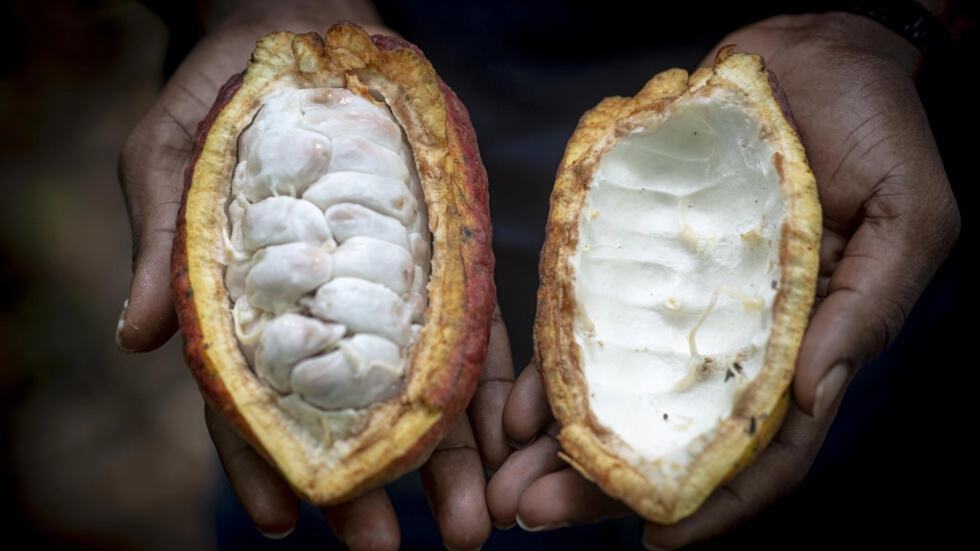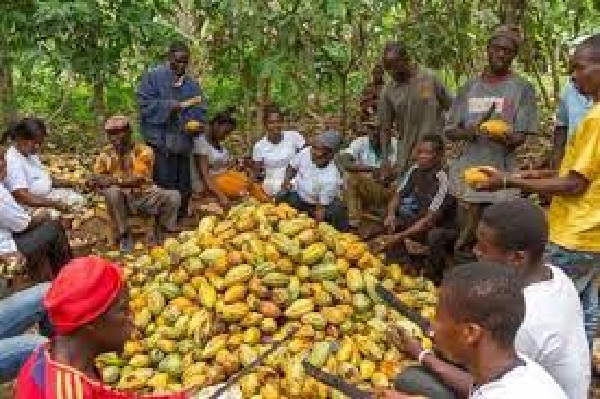Illegal mining, smuggling threaten Ghana’s cocoa industry.

Accra (AFP) – Ghana, the world’s second biggest cocoa producer, faces a growing risk to its harvest — and blow to its crisis-hit economy — from illegal mining and smugglers, industry officials, farmers and activists warn.
Top producer Ivory Coast and Ghana, together with other West African neighbours, produce two thirds of the world’s supply of cocoa, the main ingredient in chocolate.
Along with gold and oil, the cocoa industry is a mainstay of Ghana’s economy and foreign currency earnings.
Any losses in revenue hit hard, as the country struggles to weather its worst economic crisis in decades.
But cocoa production is falling victim to illegal mining, mostly for gold and known locally as “galamsey”.
It is a major problem in Ghana despite government efforts to crack down and arrest those involved who have included Chinese nationals.
“For the past five years, we’ve been experiencing serious destruction on cocoa farms as a result of activities of illegal miners,” Michael Kwarteng, director in charge of anti-illegal mining activities at Ghana Cocoa Board (COCOBOD), told AFP.
“It has reached an alarming proportion.”
Despite an incentive package to help producers increase the price of a bag of cocoa, farmers accept lucrative deals to sell off land for unlawful mining.
Rita Abena Koranteng, a 45-year-old cocoa farmer in Suhum in the Eastern Region, said the tough economic times had prompted her to give out two old pieces of land for mining.

“Every month he pays me $500 and I am happy with that because I am not going to make such an amount of money in my cocoa business,” she said.
“I know some of my colleague cocoa farms in the Western Region and other places have switched to rubber plantation now.”
Dwindling harvests, hardship
The harvest has fallen in recent years, impacted by illegal mining, experts say.
Around one million tonnes of cocoa were produced in Ghana in 2020-2021, according to COCOBOD.
It dipped to 750,000 tonnes for the 2022-2023 crop, while the forecast for the coming season is between 750,000 and 800,000 tonnes.
The government announced a 63-percent-increase this year in cocoa prices — a bag currently sells for $114 and a tonne costs $1,822.
“Farmers are giving out their lands to these illegal miners in return for huge sums of money,” Kwarteng said.
“So far, the land lost to illegal mining now accounts for two percent of the total cocoa cultivation area in Ghana.”
Sometimes cocoa farmers are even tricked into handing over land to illegal miners who claim to have a government permit to operate on it, Kwarteng said.
-‘Time bomb’ –
Once seen as an economic star and beacon of political stability in the region, Ghana has been forced to take a $3-billion credit deal with the International Monetary Fund to shore up its finances.
Inflation stands at more than 26 percent, while public debt has increased sharply.
Its economic woes weigh on President Nana Akufo-Addo’s ruling NPP party as it gears up for elections at the end of next year.
Cocoa crops generate about $2 billion in foreign exchange annually in a major contributor to government revenue and growth.

In 2021, the contribution of cocoa to GDP in real terms was about $533 million, according to the 2022 Cocoa Sector Report by GCB Strategy and Research Department.
But illegal mining is not the only problem — smugglers also target the crop.
COCOBOD has begun to offer cash rewards to whistleblowers who report illegal mining on cocoa land but also smuggling of beans, Benjamin Tei Larweh, the board’s deputy communications director, said.
“In 2022, Ghana lost about 150,000 metric tonnes of cocoa beans through smuggling to our neighbours and that was a colossal $600-million revenue gone down the drain,” he said.
Six main regions in Ghana cultivate cocoa but due to fluctuating rainfall and decreasing soil fertility, production has moved westward.
The Western Region is now Ghana’s main cocoa producer, accounting for 43 percent of the total.
But illegal mining has also grown at the same time in the region.
Obed Owusu-Addai, of EcoCare Ghana which advocates for farmers’ wellbeing, said the government had to do more to help improve prices and living standards.
“We are sitting on a time bomb as a country,” said Owusu-Addai. “If this issue is not resolved immediately, we will end up losing most of our lands to illegal mining.”
Source: france24




